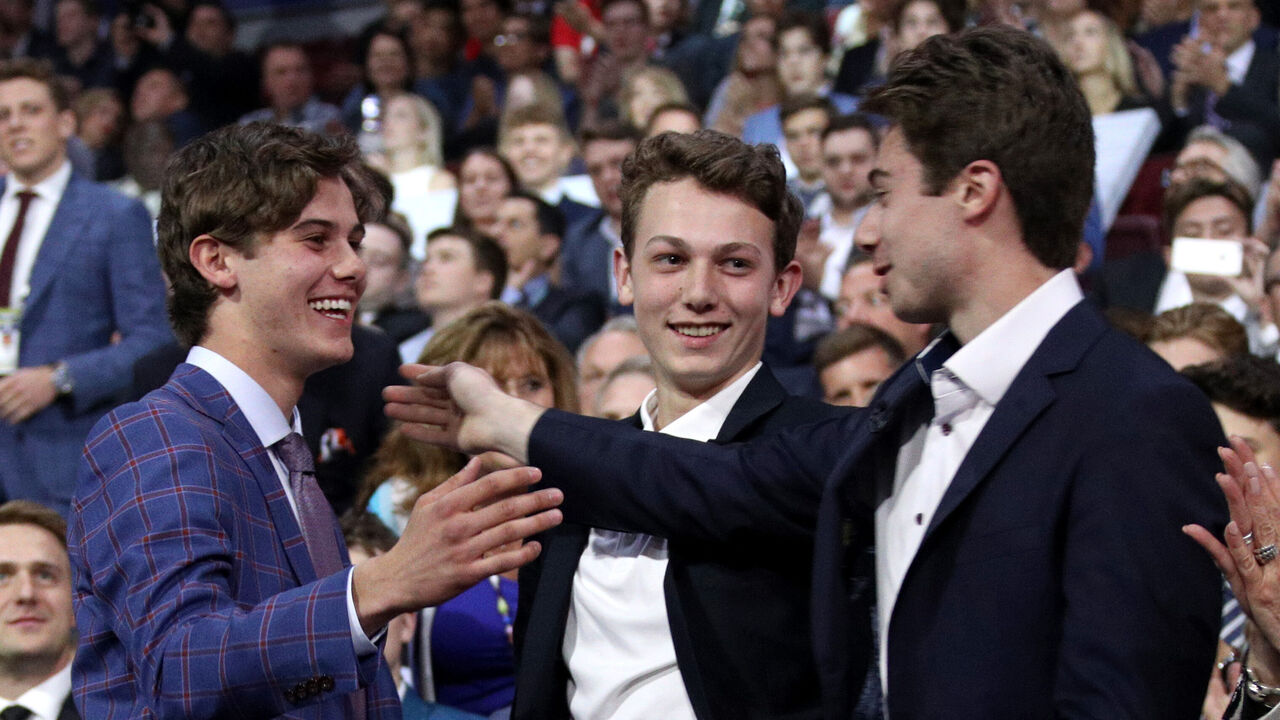Clock ticks on Hughes' time with Canucks after brother says quiet part out loud
In the hourglass of Quinn Hughes' time with the Vancouver Canucks, more sand may have slipped to the bottom half than what's left at the top.
It seems like only a matter of time before he winds up on the same team as his brothers, Jack and Luke. And spoiler alert: It probably won't be in Vancouver.
This isn't exactly breaking news, but Jack, the New Jersey Devils' superstar center, said out loud what many have long assumed.
"Honestly, I'm not afraid to say it. Yeah, I would love for Quinn to - eventually I'd love to play with him," Jack told reporters at the NHL/NHLPA player media tour Tuesday. "And whether that's in New Jersey or at what time that takes, at some point, I want to play with Quinn. But yeah, that's the question going around. They talk all day about it up in Vancouver, you know? But yeah, I'd love to play with Quinn at some point."
Quinn, unsurprisingly, downplayed Jack's comments on Wednesday.
But why wouldn't Jack want Quinn as a teammate? Playing in the NHL with your brothers is something you grow up dreaming about. Beyond the family ties, Quinn, who turns 26 in October, is firmly in the conversation for the sport's best defenseman. He won the Norris Trophy in 2024 and was a finalist last season despite missing 14 games with injury. Any player should want him on their team, let alone his brother.
Canucks president of hockey operations Jim Rutherford knows it, too. The veteran executive admitted in April that retaining the team's captain would be easier "if we brought his brothers here."
That's a pipe dream, though. Jack, 24, has five years left on his contract at an extremely team-friendly $8-million average annual value. Luke, the youngest of the brothers at 22, is a restricted free agent but remains under team control in New Jersey until 2030.
On the other hand, Quinn is two years away from unrestricted free agency. He could easily force his way out of Vancouver by refusing to sign an extension when he becomes eligible on July 1, 2026. At that point, the Canucks would have no choice but to move him. And if he's only intent on signing a deal with his brothers in New Jersey, it would be highly difficult for Vancouver to get fair value in a trade for one of the game's best players.

Still, there remains a path for Vancouver to keep its star blue-liner for at least a few more years, but it won't be easy: Win.
If the Canucks bounce back to their 2023-24 form, when they were Pacific Division champions and pushed the Edmonton Oilers to Game 7 in the second round, maybe Quinn believes the team is close to breaking through.
He could sign a three-year extension next summer, setting him up to be a UFA in 2030 - the same year Jack's contract expires and Luke is no longer under team control. That could be the best of both worlds: Quinn gets to see things through in Vancouver but still has a clear path to playing with his brothers down the line.
However, if the Canucks falter and miss the playoffs again, as they did last season, Quinn's decision becomes a lot easier: stick around with a mediocre team that's stagnating at best, or chase a Stanley Cup with his brothers on an ascending Devils squad? That seems like a no-brainer.
One thing is clear: the noise in Vancouver surrounding Quinn's potential departure will only grow louder if the team gets off to a slow start.
That puts ample pressure on the Canucks to come out of the gates hot in 2025-26, which is easier said than done for a club with a first-time head coach in Adam Foote and major question marks at center, right defense, and in net.
It's far from an ideal situation to navigate off the hop, especially for a squad that was clearly affected by last season's rift between Elias Pettersson and J.T. Miller. Can the Canucks block out the noise this time? The answer might be the difference between extending or trading the organization's franchise player a year from now.
HEADLINES
- USA holds off Denmark to win nervy round-robin clash
- Slovakia takes Group B after late goal in loss to Sweden, Finland's win
- Watch: Denmark scores from center ice on USA's Swayman
- 5 key takeaways from Canada's hard-fought victory over Switzerland
- Report: Fiala to have season-ending surgery after Olympic injury